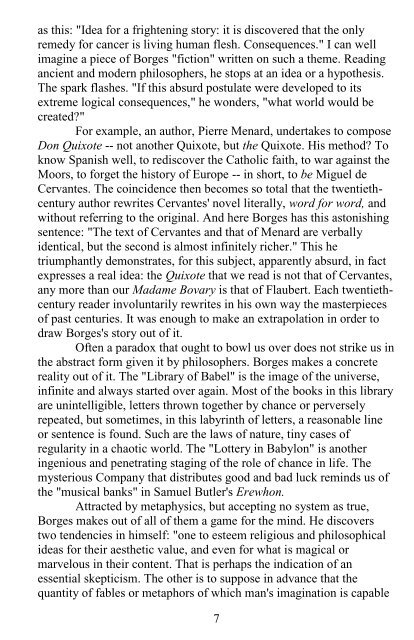Jorge Luis Borges - Labyrinths
Jorge Luis Borges - Labyrinths
Jorge Luis Borges - Labyrinths
Create successful ePaper yourself
Turn your PDF publications into a flip-book with our unique Google optimized e-Paper software.
as this: "Idea for a frightening story: it is discovered that the only<br />
remedy for cancer is living human flesh. Consequences." I can well<br />
imagine a piece of <strong>Borges</strong> "fiction" written on such a theme. Reading<br />
ancient and modern philosophers, he stops at an idea or a hypothesis.<br />
The spark flashes. "If this absurd postulate were developed to its<br />
extreme logical consequences," he wonders, "what world would be<br />
created"<br />
For example, an author, Pierre Menard, undertakes to compose<br />
Don Quixote -- not another Quixote, but the Quixote. His method To<br />
know Spanish well, to rediscover the Catholic faith, to war against the<br />
Moors, to forget the history of Europe -- in short, to be Miguel de<br />
Cervantes. The coincidence then becomes so total that the twentiethcentury<br />
author rewrites Cervantes' novel literally, word for word, and<br />
without referring to the original. And here <strong>Borges</strong> has this astonishing<br />
sentence: "The text of Cervantes and that of Menard are verbally<br />
identical, but the second is almost infinitely richer." This he<br />
triumphantly demonstrates, for this subject, apparently absurd, in fact<br />
expresses a real idea: the Quixote that we read is not that of Cervantes,<br />
any more than our Madame Bovary is that of Flaubert. Each twentiethcentury<br />
reader involuntarily rewrites in his own way the masterpieces<br />
of past centuries. It was enough to make an extrapolation in order to<br />
draw <strong>Borges</strong>'s story out of it.<br />
Often a paradox that ought to bowl us over does not strike us in<br />
the abstract form given it by philosophers. <strong>Borges</strong> makes a concrete<br />
reality out of it. The "Library of Babel" is the image of the universe,<br />
infinite and always started over again. Most of the books in this library<br />
are unintelligible, letters thrown together by chance or perversely<br />
repeated, but sometimes, in this labyrinth of letters, a reasonable line<br />
or sentence is found. Such are the laws of nature, tiny cases of<br />
regularity in a chaotic world. The "Lottery in Babylon" is another<br />
ingenious and penetrating staging of the role of chance in life. The<br />
mysterious Company that distributes good and bad luck reminds us of<br />
the "musical banks" in Samuel Butler's Erewhon.<br />
Attracted by metaphysics, but accepting no system as true,<br />
<strong>Borges</strong> makes out of all of them a game for the mind. He discovers<br />
two tendencies in himself: "one to esteem religious and philosophical<br />
ideas for their aesthetic value, and even for what is magical or<br />
marvelous in their content. That is perhaps the indication of an<br />
essential skepticism. The other is to suppose in advance that the<br />
quantity of fables or metaphors of which man's imagination is capable<br />
7


